
Do Air Conditioners Help With Allergies?
Summer is a time for outdoor fun and relaxation, but for many, it also means enduring the discomfort of seasonal allergies. Itchy eyes, sneezing, and a runny nose are common symptoms of what is commonly known as “allergy season”, typically during spring and summer when plants release more pollen.
However, escaping indoors doesn’t always bring relief; in fact, the air quality inside your home can sometimes be worse than outside. This is where a well-maintained HVAC system plays a crucial role in improving indoor air quality and reducing allergy symptoms.
In this article, you will find the answer to the question: “Do air conditioners help with allergies?”
Understanding Seasonal Allergies
What Causes Seasonal Allergies?
Seasonal allergies occur when airborne particles like pollen, pet dander, dust mites, and mold enter your home, making it difficult for allergy sufferers to breathe easily. These particles can trigger symptoms such as sneezing, itchy eyes, nasal congestion, and headaches.
For those with sensitive immune systems, these allergens can cause significant discomfort, as the body reacts to these otherwise harmless substances as if they were dangerous invaders.
Common Symptoms of Seasonal Allergies
Seasonal allergies often mimic the symptoms of a common cold, making it challenging to distinguish between the two. Key symptoms include:
- Sneezing
- Itchy or watery eyes
- Runny or stuffy nose
- Sinus pressure and headaches
- Itchy throat and ears
- Coughing or wheezing
These symptoms can severely impact your quality of life, especially during peak allergy seasons. Fortunately, there are ways to minimize your exposure to allergens, and it all starts with your HVAC system.
How Do Air Conditioners Help with Allergies?
The Importance of HVAC Systems in Managing Allergies
One of the most effective ways to combat indoor allergens is by maintaining your home’s HVAC system. But do air conditioners help with allergies? The answer is a resounding yes. A clean and well-maintained HVAC system can significantly reduce the number of airborne allergens circulating in your home.
Controlling Temperature and Humidity
Allergens such as mold and dust mites thrive in warm, humid environments. By regulating indoor temperature and humidity, your HVAC system can create conditions that are less favorable for these allergens to grow. When your air conditioner is functioning correctly, it not only cools the air but also dehumidifies it, reducing the moisture levels that mold and dust mites need to survive.
Enhancing Air Filtration
Another way air conditioners help with allergies is through improved air filtration. Modern HVAC systems are equipped with high-efficiency filters that can capture a significant amount of airborne particles, including pollen, dust, and pet dander. Regularly replacing these filters ensures that your HVAC system continues to trap these allergens before they can circulate throughout your home.
Promoting Adequate Ventilation
Adequate ventilation is crucial for preserving high indoor air quality. Your HVAC system plays a vital role in this by bringing in fresh outdoor air while expelling stale indoor air. This exchange helps dilute the concentration of indoor allergens, making it easier for allergy sufferers to breathe.
Essential HVAC Maintenance Tips for Allergy Prevention
Regular HVAC System Inspections
To ensure your HVAC system is doing its job in reducing allergens, regular maintenance is key. Have a professional inspect your system at least once a year to check for any issues that could compromise its efficiency. During these inspections, a technician will clean or replace the filters, inspect for mold growth, and verify that all components are operating properly.
Keep an Eye on Moisture-Prone Areas
Certain parts of your HVAC system are more prone to moisture buildup, which can lead to mold growth. These areas include the condensate drip pan, air handler, evaporator coils, and air ducts. If you notice any signs of mold, it’s important to address the issue immediately. While minor mold growth can often be cleaned up with household products, larger infestations may require professional remediation.
Replace Air Filters Regularly
One of the simplest yet most effective ways air conditioners help with allergies is by regularly replacing the air filters. Depending on the type of filter your HVAC system uses, it should be replaced every one to three months. This not only helps improve indoor air quality but also keeps your system running efficiently.
Clean the Area Around Your Outdoor Unit
Debris such as leaves, grass clippings, and dirt can accumulate around your HVAC system’s outdoor unit, which can then be drawn into your home. Make it a habit to clean around this unit regularly to prevent debris from affecting your indoor air quality.
Dust and Vacuum Regularly
Indoor dust can easily be drawn into your HVAC system and circulated throughout your home. Regularly dusting and vacuuming your living spaces, as well as the area around your HVAC system can help reduce the amount of dust and allergens in the air.
Additional Steps to Improve Indoor Air Quality
A few recommendations from the experts:
- Use a dehumidifier. If your home tends to be humid, consider using a dehumidifier in conjunction with your HVAC system. Dehumidifiers help reduce moisture levels, making it harder for mold and dust mites to thrive.
- Install an air purifier. For those with severe allergies, adding an air purifier to your home can provide an extra layer of protection. Air purifiers work by capturing even smaller particles than standard HVAC filters, ensuring that the air you breathe is as clean as possible.
- Seal air leaks. Air leaks in your home can allow outdoor allergens to enter, making your indoor air quality worse. Check for leaks around windows, doors, and other openings, and seal them to prevent allergens from sneaking in.
- Consider upgrading your HVAC system. If your HVAC system is old or not functioning efficiently, it may be time for an upgrade. Modern systems are designed with improved air filtration and humidity control, making them more effective at reducing indoor allergens.
The Impact of Indoor Air Quality on Health
How Poor Indoor Air Quality Affects Allergies?
Poor indoor air quality can exacerbate allergy symptoms, leading to more frequent and severe reactions. When allergens like pollen, dust mites, and mold spores circulate in the air, they can trigger asthma attacks, sinus infections, and other respiratory issues in sensitive individuals. This is why maintaining your HVAC system is so crucial – by ensuring that your indoor air is clean, you can reduce the likelihood of these health problems.
Long-Term Benefits of a Well-Maintained HVAC System
Investing in regular HVAC maintenance not only helps alleviate allergy symptoms but also offers long-term health benefits. Clean air reduces the strain on your respiratory system, leading to better overall health and well-being. Additionally, a well-maintained HVAC system operates more efficiently, which can lower your energy bills and extend the lifespan of your equipment.
Why Is Professional HVAC Maintenance Essential?
The Expertise of HVAC Professionals
While there are many steps you can take on your own to maintain your HVAC system, professional maintenance is still essential. HVAC professionals have the expertise and tools needed to thoroughly clean and inspect your system, ensuring that it operates at peak efficiency.
Preventing Costly Repairs
Regular professional maintenance can also help prevent costly repairs by catching potential issues early. By keeping your system in good working order, you can avoid the inconvenience and expense of unexpected breakdowns.
Ensuring Optimal Air Quality
When it comes to reducing allergens and improving indoor air quality, the details matter. A professional HVAC technician will know exactly what to look for, from checking for leaks and mold to ensuring your system is properly ventilated. This attention to detail can make a significant difference in the air you breathe.
Conclusion
So, do air conditioners help with allergies? Absolutely. Maintaining a clean and efficient HVAC system can significantly reduce the number of allergens in your home and improve your overall comfort during allergy season. Regular maintenance, proper filtration, and effective humidity control are key factors in keeping your indoor air quality high and your allergy symptoms low.
Take Action Today
Don’t let seasonal allergies ruin your summer. You can create a healthier, more comfortable indoor environment by taking proactive steps to maintain your HVAC system. If you’re ready to improve your indoor air quality and reduce your allergy symptoms, contact McMillin Air today at 623-432-5202. Our team of HVAC experts is here to help you breathe easier.

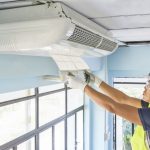
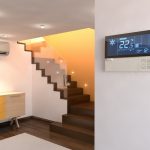
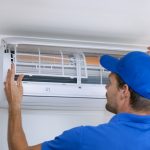
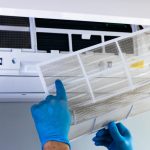
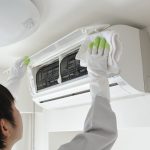


0 comments